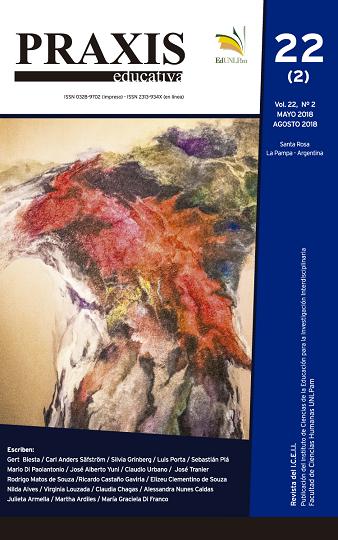Time and freedom in Education Some Latin American notes on the Manifesto for Education of Biesta y Säfström
DOI:
https://doi.org/10.19137/praxiseducativa-2018-220207Keywords:
temporal articulations-educational freedom-Manifesto for Education. quality education-Latin AmericaAbstract
This essay discusses Biesta and Säfström’s Manifesto for Education relation between time and freedom in education. I debate three theoretical nodes of this relation. First, I relate history of educational research in Latin America for demonstrate the strong theoretical and spatiallimitation of Biesta and Säsftröm concept and how temporal articulationsare similar in two antagonist perspectives: new educational theories and quality of education. Latter, is central in historical phenomena when educational research professionalization produce teachers deprofessionalization. Second, I argue how the temporal articulation based in the regime of historicity called presentism, reduce freedom possibilities in education, especially teacher’s freedom to be. Finally, the political and theoretical principles of the proposal of Manifesto are shared, but it opposes universal temporary articulation that restricts divergent paths to diverse forms of freedom in the educational sphere.
Downloads
References
Apple, M. (2012). Poder, conocimiento y reforma educacional. Buenos Aires: Miño y Dávila editores.
Biesta, G. y C. A. Säfström (2011). “A Manifesto for Education” en Policy Futures in Education.
Coombs, P. (1971). La crisis mundial de la educación. Barcelona: Península.
De Sousa Santos, B. (2010). Refundación del Estado en América Latina: perspectivas desde una epistemología del sur. Buenos Aires: Siglo XXI editores.
Frabboni, F. y F. Pinto Minerva (2006). Introducción a la pedagogía general. México: Siglo XXI.
Gorostiaga, J., C. Tello y N. J. Isola (2012). “Investigación educativa en América Latina: notas históricas y tendencias recientes” en Gorostiagan, J., M. Palamidessi y C. Suasnábar, (comps.). Investigación educativa y política en América Latina. Buenos Aires: Noveduc.
Hartog, F. (2003) Regímenes de historicidad. México: Universidad Iberoamericana
Koselleck, R. (1993). Futuro pasado. Para una semántica de los tiempos históricos. Barcelona: Paidós.
Plá, S. (en prensa). Calidad educativa en México. Historia de una política para la desigualdad. México: UNAM-IISUE.
Pontón, C. (2011). Configuraciones conceptuales e históricas del campo pedagógico y educativo en México, México, UNAM-IISUE.
Rivzi, F. y B. Lingard (2013). Políticas educativas en un mundo globalizado. Madrid: Morata.
Rüsen, J.. (2001). “What is Historical Consciousness?. A Theoretical Approach to empirical Evidence”. Paper presentedo en el Canadian Historical Consciousness in an International Context: Theoretical Frameworks, Voncouver, University de British Columbia.
Yun, S. (2014) “Education, Freedom, and Temporality: A Response to Biesta and Säfström’s Manifesto”. Journal of Philosophy of Education, Vol. 48, No. 3.
Downloads
Published
Issue
Section
License
Copyright Notice
Editorial Committee Educational Praxis Magazine:
I hereby declare that I am the author of the article titled (article name), that it is original and my own and that it was not previously published in any other format or medium. I declare to know that the magazine will not charge me any type of fee under any circumstances, nor will I receive any type of monetary compensation If it were accepted for publication in Educational Praxis, I authorize the aforementioned magazine to publish it digitally and to advertise it on its social networks.
If the work is published, I adhere to the Creative Commons license called "Attribution - Non-Commercial Share Alike CC BY-NC-SA", through which it is allowed to copy, reproduce, distribute, publicly communicate the work and generate derivative works, as long as when the original author is cited and acknowledged. This license has been used since September 2018. In 2016 CC BY NC ND 4.0 was adhered to; and in the years 2017 and 2018 (January-August) CC BY NC 4.0.
This CC BY-NC-SA Share Alike license does not, however, permit commercial use of the work. As an author, the journal may establish additional agreements for the non-exclusive distribution of the version of the work published in the journal, it allows me to self-archive the published articles, in their post-print version, in institutional, thematic repositories, personal web pages or any other relevant use. with the recognition of having been first published in this journal.
Educational Praxis adheres to DORA (Declaration on Research Assessment) signed in San Francisco, California, on December 16, 2012, and to the Declaration of Mexico (Joint Declaration LATINDEX - REDALYC - CLACSO - IBICT).















_(1)2.png)


3.png)











_(2).png)






2.jpg)









